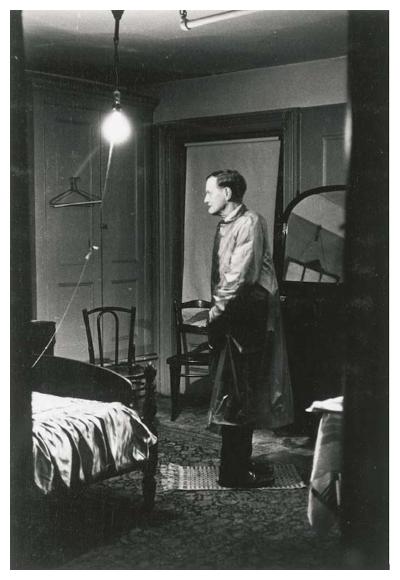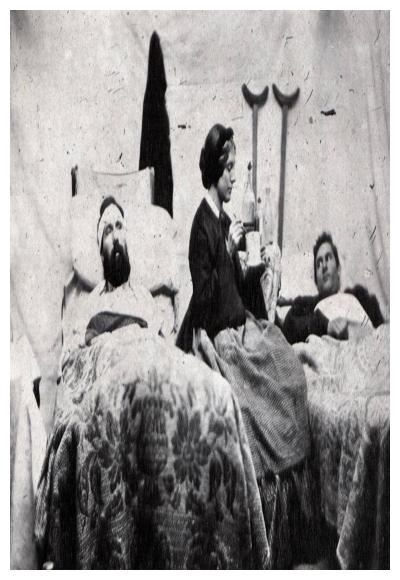
Synopsis/Details
New York, 1944. Emily Johnson lives in a furnished room in a building that houses other, similar rooms. Though she is married, her husband is in the army, and Emily supports herself by working in Manhattan. She has lived in her room for six weeks, and during the most recent two weeks, she has noticed that small articles from the room are missing. Among the items missing are handkerchiefs, a hairpin, and a small bottle of perfume. Emily hesitates to tell her landlord about this problem, because she believes that she will be able to handle the situation and discover the identity of the thief on her own. Indeed, Emily suspects that the culprit is the only person in the building who remains at home every day. Then she spots someone exiting her room one Sunday; the same day, Emily decides to confront this person.
She knocks on the door of Mrs. Allen, whose room is almost the same as her own yet who is over twice as old as Emily (and has lived in this building for three years). The two women chat briefly, and Emily learns that Mrs. Allen’s husband, who also was in the army, died five years earlier. The Allens never had any children, but Mrs. Allen keeps photographs of her late husband’s nieces and nephews. Though a flower-lover herself, Emily comments on Mrs. Allen’s plants, and the latter informs her that dropping aspirin into their water helps flowers grow. Emily is eventually able to confront Mrs. Allen about the missing items, although only indirectly. She explains the situation to the older woman and hints that she knows who the perpetrator is, while assuring Mrs. Allen that she does not wish to raise the issue with the landlord.
Emily simply expresses her desire that the pilfering stop—something with which Mrs. Allen agrees. In response to Emily’s concern that someone has a key to her door, Mrs. Allen quickly informs her that the keys to all of the rooms in the building are interchangeable: they are skeleton keys. Shortly thereafter, Mrs. Allen excuses herself and retires to bed for a nap. The next day, however—Monday—Emily returns from work to discover that now a pair of earrings and two packages of Kleenex are missing. She considers the situation, writes a letter to her husband, and decides upon a course of action. The next day, Emily calls in sick to work and remains at home, listening until Mrs. Allen finally leaves the building. Then she lets herself into Mrs. Allen’s room for a look around.
Once in the older woman’s room, Emily realizes again how strangely similar Mrs. Allen’s place is to her own. Emily searches the closet and then the dresser, in which she finds all of her missing belongings neatly arranged in two of the drawers. While Emily is looking through the second drawer, she realizes that Mrs. Allen stands in the doorway, watching her. The younger woman can barely explain herself to the older one, who does not appear to be upset. Emily simply cannot bring herself to truthfully account for her presence in someone else’s room, and instead claims that she let herself in because she needed aspirin for a bad headache. Mrs. Allen graciously accepts her explanation, gives Emily aspirin, and advises her to take two, then lie down for an hour. Emily departs, and Mrs. Allen promises to check on her later that day.
Story & Logistics
Story Type:
Pursuit
Story Situation:
Daring enterprise
Story Conclusion:
Ambiguous
Linear Structure:
Linear
Moral Affections:
Accusation, Disapprobation, Guilt, Innocence, Right, Wrong
Cast Size:
Couple
Locations:
Couple
Characters
Lead Role Ages:
Female Adult, Female over 45
Hero Type:
Anti-Hero, Ordinary
Villian Type:
Criminal, Mentally Disturbed
Stock Character Types:
Crone, Damsel in distress, Girl next door
Advanced
Adaption:
Based on Existing Fiction
Subgenre:
Crime & Gangster, Crime Drama, Drama, Generation Gap, Life Story, Literary Adaption, Mysteries, Suspense-Thriller, Woman’s Friendship
Equality & Diversity:
Elderly Protagonist, Female Centric, Female Protagonist
Life Topics:
Quarterlife Crisis, Retirement Home/Nursing Home, The Elderly
Super Powers:
Physical or mental domination
Time Period:
Great Depression (1929 – World War II), Late modern period, World War II (1939–1945)
Country:
United States of America (USA)
Time of Year:
Summer
Illness Topics:
Psychological
Relationship Topics:
Activities, Affinity, Bonding, Emotions and feelings
Writer Style:
Raymond Chandler, Rod Serling, Stephen King




















